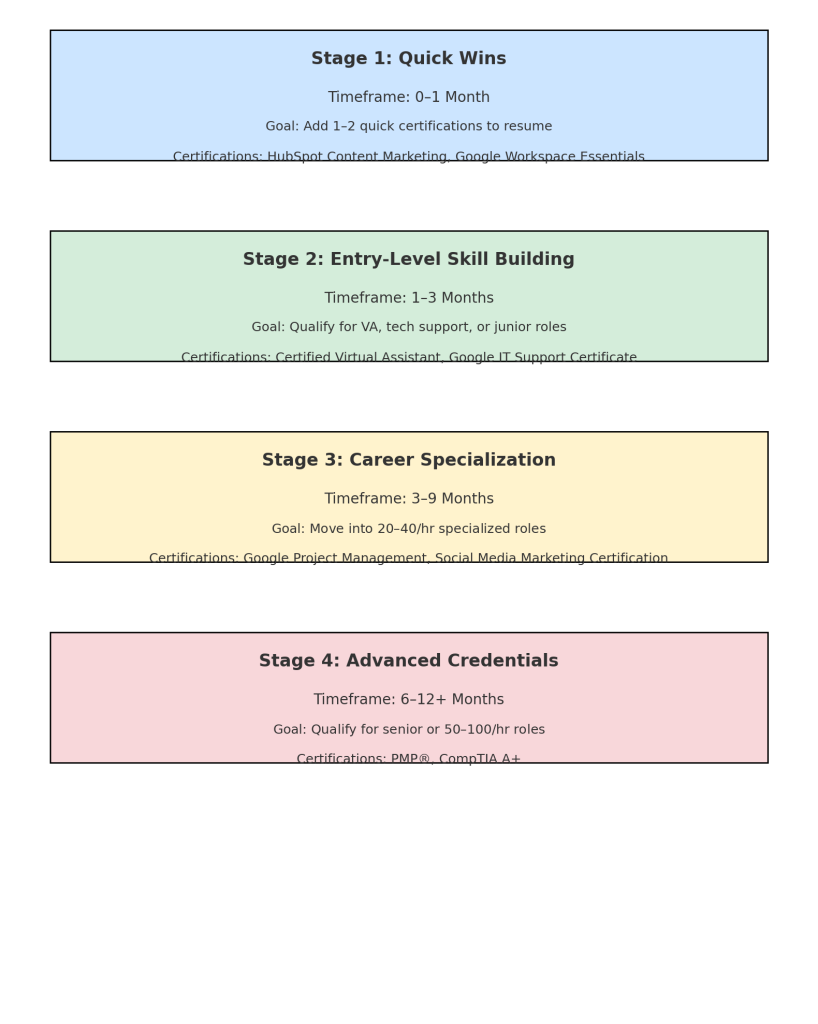Breaking into remote work can feel overwhelming, there’s no shortage of advice online, and yet the path from “I want to work from home” to “I’m earning a sustainable income” often isn’t clear.
Certifications can change that. They give you proof of skill, help you stand out to clients and employers, and give you the confidence to take on new roles. But just like building a career, the smartest approach is to progress step-by-step, starting with quick wins, then moving into specializations and advanced credentials.
This roadmap lays out exactly how to go from beginner to expert in remote-friendly fields.
Stage 1: Quick Wins (0–1 Month)
Before you spend hundreds of dollars or months studying, it’s smart to start with short, low-cost certifications that instantly strengthen your resume. These courses let you explore different career paths while showing potential employers you’re committed.
- HubSpot Content Marketing Certification
Cost: Free | Time: ~6 hours
Teaches the fundamentals of SEO, blog writing, and content promotion, skills that are highly marketable for virtual assistants, social media managers, and freelance writers. - Google Workspace Essentials
Cost: Free | Time: ~2 hours
Covers Gmail, Docs, Sheets, and Drive, tools used in nearly every remote role, from admin work to project coordination.
Goal for Stage 1: Add 1–2 quick certifications to your LinkedIn and resume so you’re ready to apply for entry-level roles.
Stage 2: Entry-Level Skill Building (1–3 Months)
Once you’ve got your first credentials, it’s time to focus on job-ready skills for beginner remote positions. These certifications will help you qualify for your first steady contract or employee role.
- Certified Virtual Assistant (VA)
Cost: $300–$500 | Time: 4–8 weeks
Prepares you for administrative support roles by teaching productivity systems, online tools, and client communication. - Google IT Support Professional Certificate
Cost: ~$49/month (Coursera) | Time: ~6 months (self-paced)
A beginner-friendly IT credential covering troubleshooting, networking, and customer support—perfect for remote tech help desk roles.
Goal for Stage 2: Gain skills that let you apply confidently for virtual assistant, tech support, or junior marketing positions.
Stage 3: Career Specialization (3–9 Months)
With some experience under your belt, the next step is to specialize. Specialization lets you charge more, stand out from generic applicants, and qualify for more challenging work.
- Google Project Management: Professional Certificate
Cost: ~$49/month | Time: 3–6 months
Covers Agile, Scrum, planning, and stakeholder management—skills that prepare you for remote project coordinator or junior PM roles. - Social Media Marketing Certification (Meta or Hootsuite)
Cost: Free–$99 | Time: 5–20 hours
Equips you to manage campaigns, analytics, and brand growth for remote clients or employers.
Goal for Stage 3: Move into specialized positions paying $20–$40/hour or more by leveraging targeted skills.
Stage 4: Advanced Credentials (6–12+ Months)
At this stage, you’re aiming for senior-level positions or high-value contracts. These certifications require more time and often more experience but can significantly increase your income potential.
- PMP® (Project Management Professional)
Cost: $405–$555 | Time: Varies (plus experience requirements)
One of the most respected project management certifications, ideal for leading large, distributed teams. - CompTIA A+
Cost: ~$500 (for both exams) | Time: 3–6 months
Industry-standard IT certification proving advanced troubleshooting and technical skills for remote IT and cybersecurity work.
Goal for Stage 4: Qualify for roles paying $50–$100/hour or six figures annually, with the expertise to lead projects or handle complex technical work.
Putting the Roadmap into Action
If you’re starting from scratch, here’s what your first year could look like:
- Month 1: Complete HubSpot Content Marketing and Google Workspace Essentials.
- Months 2–3: Earn your Certified Virtual Assistant credential or start the Google IT Support Certificate.
- Months 4–6: Add the Google Project Management Certificate or a social media marketing course.
- Months 7–12: Build experience, then prepare for an advanced credential like PMP or CompTIA A+.
By following this sequence, you’re not just collecting certificates—you’re building a layered skill set that grows your earning potential at every step.
Bottom line: Remote work isn’t just about finding a job you can do in your pajamas. It’s about creating a career with flexibility, stability, and room to grow. This certification roadmap gives you a clear, structured way to make that happen—whether you’re aiming for your first client or a senior role with global reach.


Leave a Reply